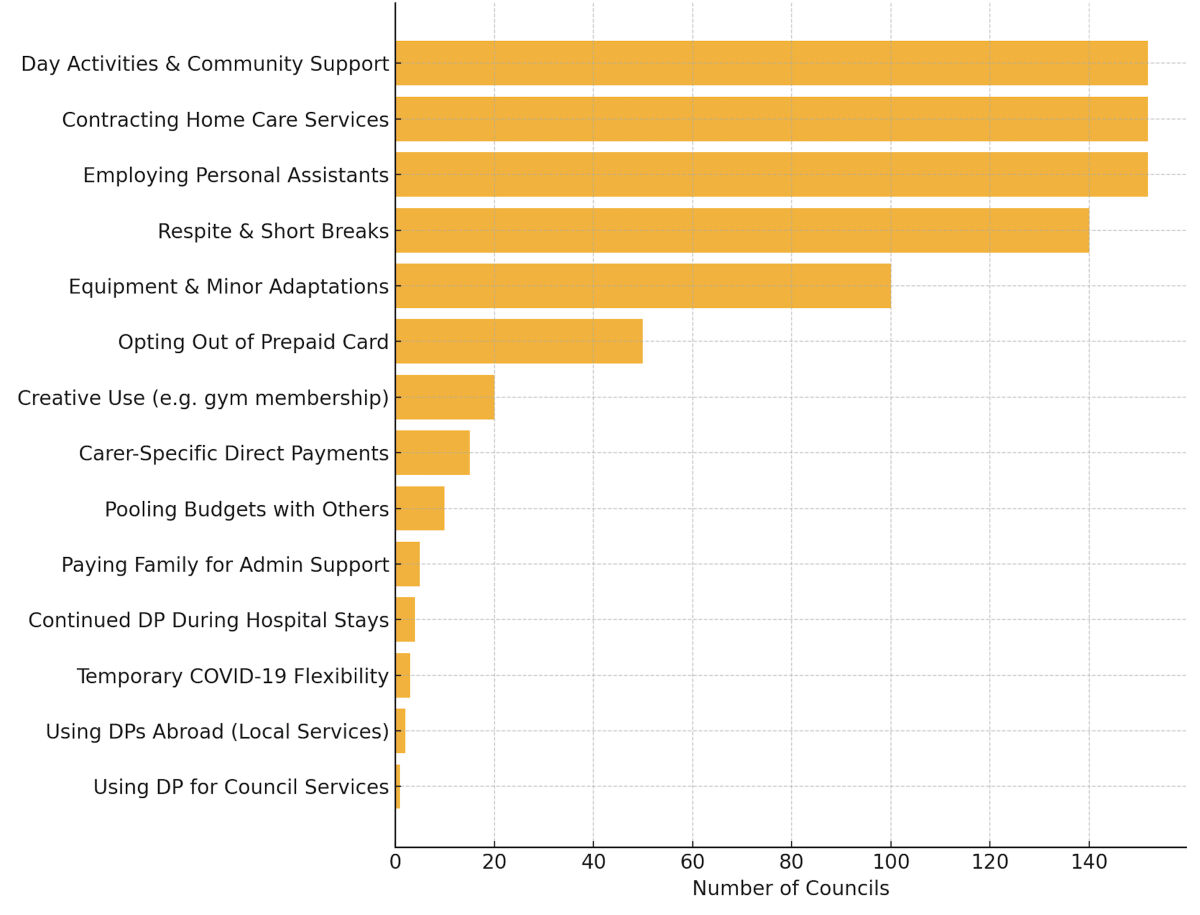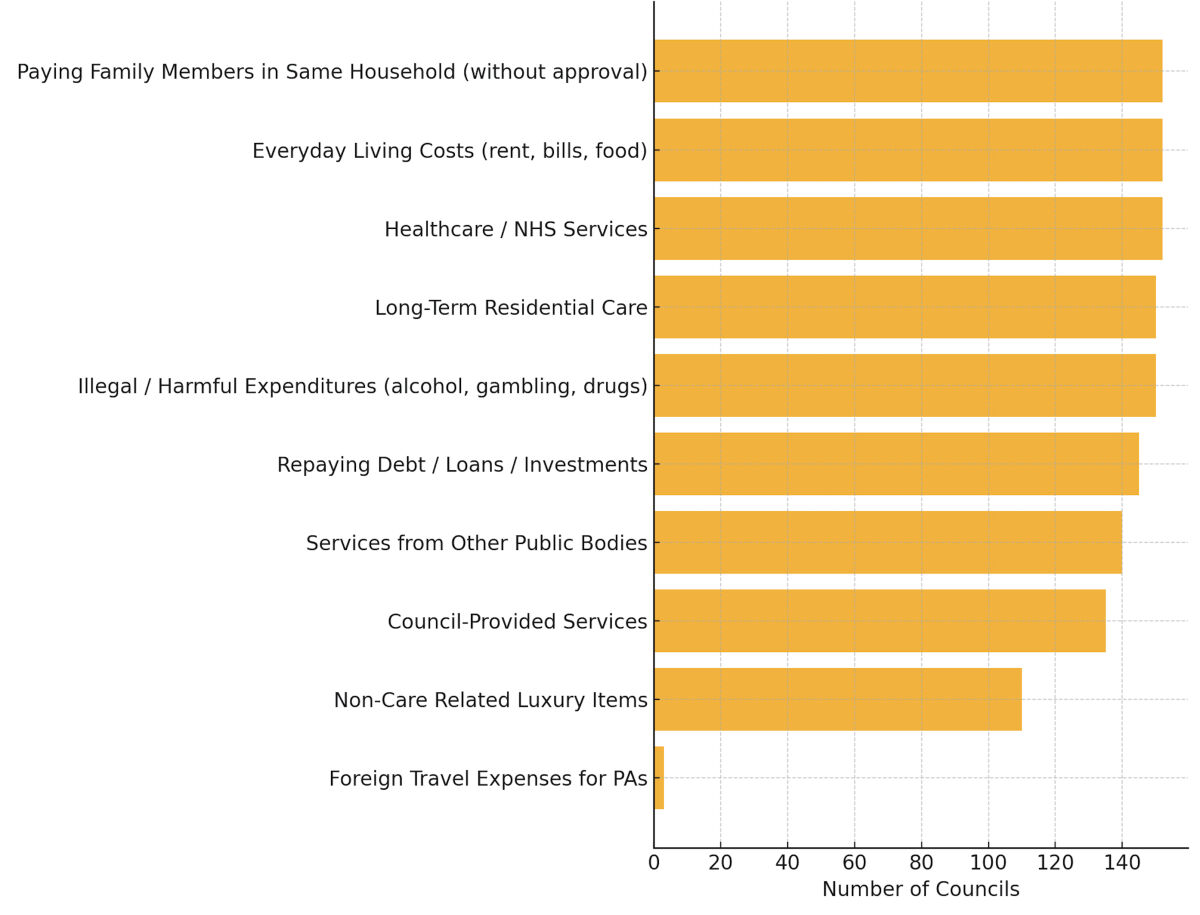A review of direct payment policies across English councils, identifying opportunities for more flexibility.
Author: Chris Watson
Findings and implications for adult social care commissioners under the Care Act 2014.
This briefing is intended for local authority commissioners and senior leaders in adult social care. Its aim is to support more effective and confident commissioning practice by exploring how Direct Payments are currently interpreted in policy across English councils, and to identify where greater flexibility can be encouraged in line with the Care Act 2014.
The article draws on a review of all 152 English Local Authority Direct Payment policy documents and guidance available in the public domain. It highlights common patterns, identifies where good practice exists, and considers where commissioning and policy decisions may inadvertently restrict personalisation.
In doing so, it provides commissioners with:
The overarching aim is to ensure that local systems support choice, control and flexibility in the use of personal budgets — in keeping with both the letter and spirit of the Care Act.
Direct Payments are a key mechanism through which local authorities can deliver on the personalisation agenda in adult social care. They allow individuals to take control of their personal budget and use it to arrange support in a way that meets their assessed needs and promotes their wellbeing.
The Care Act 2014 and the Care and Support (Direct Payments) Regulations 2014 provide the statutory foundation for Direct Payments in England. Local authorities have a duty to offer a Direct Payment where a person is eligible, has capacity (or an authorised representative), and consents to receive one.
The Act and its statutory guidance are explicit that Direct Payments should be:
The legislation does not limit the use of Direct Payments to specific service types — instead, it places the emphasis on whether the use is legal, safe, and aligned to the person’s care and support plan.
The introduction of Direct Payments — and their continued development through the personalisation reforms of the 2000s — was rooted in a commitment to giving people more control over their care. By enabling individuals to shape their support in ways that make sense to them,
Direct Payments can:
The personalisation agenda, strengthened by the Care Act, recognises that people themselves are often best placed to determine how to meet their needs, and that flexibility, autonomy and trust are essential principles.
Despite the clear legislative intent, there is anecdotal and documented evidence that in many areas, Direct Payments are implemented in ways that are restrictive, risk-averse, or lacking in clarity.
This can result in:
This review was therefore undertaken to explore how local authorities are interpreting flexibility and restriction in their Direct Payment policies, with a view to informing more enabling commissioning practice.
The Care Act statutory guidance is clear: personal budgets, including Direct Payments, are intended to support people in achieving personalised outcomes. This includes the flexibility to arrange support in a way that reflects the person’s preferences, routines, aspirations, and cultural context.
To understand how this flexibility is interpreted in practice, we reviewed policy documents and guidance from all 152 English councils. Our focus was on what councils explicitly state as permissible uses for Direct Payments beyond core care arrangements.
All councils support the use of Direct Payments for:
These uses are well established and consistently articulated across local authority documents.
However, beyond these core functions, the degree to which councils encourage or even mention alternative, creative or non-traditional uses varies considerably.
The chart below summarises the frequency with which different types of flexible use are mentioned in council policy documents.

Figure 1. Flexibility in the use of Direct Payments by English Councils. Based on public policy guidance and Direct Payment user documents (n=152 councils)
Respite and Equipment: Around 140 councils permit Direct Payments to be used for short breaks or respite care, and 100 councils allow them to be used for equipment or minor adaptations. These are important options for many families and can help reduce long-term support needs.
Creative Uses: Only 20 councils provide examples of flexible, creative uses such as gym memberships, transport costs for meaningful activity, or engagement in hobbies or learning opportunities. Where these are included, the tone of guidance tends to be more enabling and outcome-focused.
Pooling Budgets and Admin Support: Fewer than 10 councils mention the possibility of pooling budgets with others to arrange shared support. Only five refer to paying a family member for help with managing the Direct Payment (e.g. as a personal assistant for admin purposes).
Use Abroad and Prepaid Card Opt-Outs: Just two councils provide guidance on the use of Direct Payments while abroad, despite this being lawful in certain circumstances. Around 50 councils mention that citizens can opt out of using a prepaid card — although some require formal requests or justification.
Hospital Stays: Very few councils clearly state whether a Direct Payment continues during a short hospital stay, despite national guidance advising that it should, where practical and in the person’s interest.
This variation in permitted uses reflects differences not in the law, but in local interpretation, confidence, and policy framing.
Where flexibility is explicitly encouraged:
Where flexibility is limited or unclear:
Commissioners have a key role in ensuring that local policy and practice promote the full range of possibilities that Direct Payments allow. This means working with care management teams, Direct Payment support services and user-led organisations to shift culture and practice toward enabling and outcome-focused models.
While the Care Act encourages flexibility in how Direct Payments are used, it also requires that payments are not used in ways that are unlawful, unsafe, or unrelated to assessed needs.
As part of our review, we analysed local authority policy documents to understand how councils are communicating the boundaries of Direct Payment use. This includes what they prohibit outright, what they discourage, and how much discretion or explanation they provide.
Most councils list a broadly similar set of items that cannot be funded through Direct Payments. These generally align with national guidance and case law, but in some areas, additional or more restrictive exclusions are introduced.
The chart below summarises the frequency of different prohibitions mentioned across English councils.

Figure 2. Prohibited Uses of Direct Payments Across English Councils . Based on a review of council policies and public guidance documents.
Universally Prohibited Items: All councils prohibit the use of Direct Payments for:
Frequently Prohibited but Open to Interpretation:
Less Common but Noteworthy Restrictions:
There is significant variation in how councils present prohibited uses:
This lack of consistency can result in:
Restrictive or poorly explained prohibitions can dilute the value of Direct Payments as a tool for personalisation.
Commissioners should be alert to policies that:
At the same time, it is important that boundaries are clearly articulated and defensible. The challenge is to maintain clarity without rigidity, and to apply proportionate oversight without defaulting to restriction.
Local policies should distinguish between:
While many local authorities adopt a cautious or narrowly defined approach to Direct Payments, a small but growing number of councils demonstrate more enabling, person-centred practice. These councils recognise that flexibility is not a risk to manage, but a necessary condition for personalisation, independence and improved outcomes.
Councils demonstrating positive practice tend to share the following characteristics:
They also tend to adopt a tone of trust in their guidance — positioning the citizen as a partner in planning and spending decisions, rather than a risk to be monitored.
The following examples illustrate how some local authorities are going further in supporting flexible use:
These councils provide a counterpoint to the default assumption that Direct Payments should only be used to replicate commissioned services. Their guidance reflects a willingness to engage with complexity and an understanding that individualised support requires individualised decision-making.
Commissioners in these areas have played a vital role in shaping local guidance that is:
Positive practice shows that flexible Direct Payments can support:
In a time of budget constraints, these approaches are not just more person-centred — they are also more sustainable.
The findings of this review have direct implications for local authority commissioning functions. As the strategic leaders of the care and support system, commissioners play a central role in shaping the interpretation, application, and delivery of Direct Payments.
Even where the operational delivery of Direct Payments sits with care management or finance teams, commissioners influence the culture, tone, and permissiveness of local systems through policy decisions, provider frameworks, and strategic priorities.
The way that Direct Payments are described in local guidance has a significant impact on how they are used in practice.
Commissioners can and should challenge policy documents or practitioner handbooks that default to restrictive language, or that treat flexibility as an exception rather than a feature.
The effectiveness of a Direct Payment rests on the quality of the underlying care and support plan. If plans are service-led, vague or generic, then Direct Payments risk becoming a way to buy more of the same — rather than a route to something different and better.
Commissioners should ensure:
Where this is embedded, more varied and creative uses of Direct Payments become not only possible but expected.
Many councils have introduced prepaid card systems to monitor Direct Payments, but in some cases this has led to:
Commissioners should:
The Care Act guidance is clear: monitoring must be proportionate to risk. Over-monitoring low-risk users can drive up costs and disengagement.
There is a tendency to view flexibility as a risk to be managed — but in reality, it can be a lever for prevention, independence and sustainability.
Where Direct Payments are used to:
They deliver better outcomes and reduce demand on formal services.
Commissioners should develop business cases that reflect the true value of flexibility — not only in improving lives, but in managing public resources more effectively.
This section sets out a series of practical recommendations for commissioners seeking to improve the effectiveness and flexibility of Direct Payments in their local area. These actions are aligned with the Care Act 2014 and reflect learning from local authorities that have developed more enabling policy frameworks.
Direct Payments remain one of the most powerful levers for delivering personalised, outcome-focused care and support under the Care Act 2014. At their best, they enable individuals and families to design support that fits their lives, draws on their strengths, and avoids unnecessary reliance on traditional services.
However, this national review of local authority policies shows that the implementation of Direct Payments is uneven. While some councils demonstrate bold, enabling approaches that reflect the spirit of the legislation, others adopt a more cautious, restrictive stance. These differences are not rooted in law, but in local interpretation, culture, and commissioning practice.
For commissioners, this represents both a challenge and an opportunity.
The challenge lies in addressing outdated or overly risk-averse frameworks that constrain innovation, limit take-up, and diminish the value of Direct Payments.
The opportunity is to lead a shift toward more confident, proportionate, and person-centred commissioning — one that:
This approach ensures that Direct Payments function as a practical tool for delivering personalised support, rather than being reduced to an administrative process.
The publisher is Citizen Network. Direct Payments and Flexibility © Chris Watson 2025.
Self-Directed Support, social care, England, Article